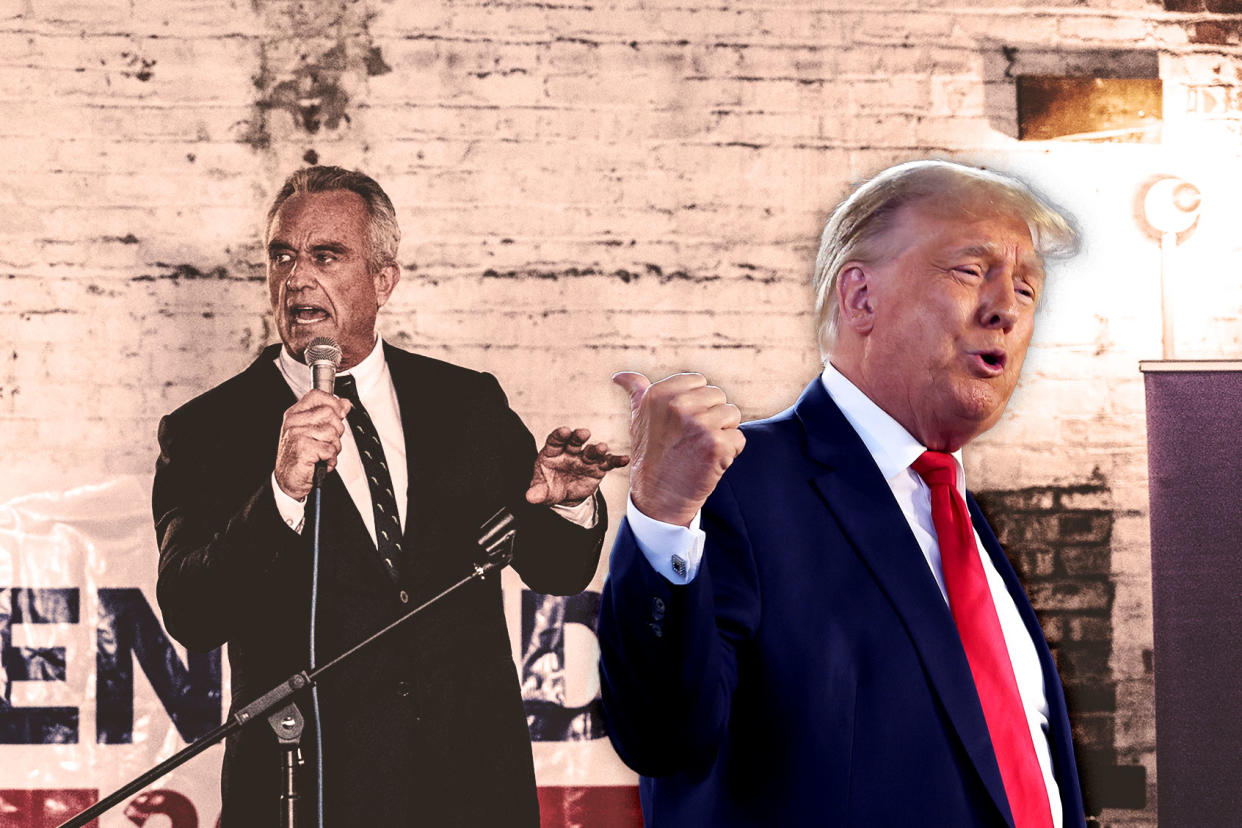There's a solution to Democrats' RFK Jr. problem: Ranked-choice voting

- Oops!Something went wrong.Please try again later.
Summer in Hyannisport just got awkward. In a prominent and very public disavowal of one of their own, more than a dozen members of the Kennedy family endorsed Joe Biden this week, casting the independent candidacy of Robert F. Kennedy Jr. as a threat that could return Donald Trump to the White House.
It’s a threat that national Democrats are taking seriously. Democrats have accused Kennedy and a Super PAC supporting his campaign of violating election law in their efforts to get him on state ballots. A new report in Puck suggests that Democratic opposition researchers have targeted his wealthy running mate, Nicole Shanahan, eager to make her as uncomfortable in liberal California tech circles as RFK Jr. is likely to be at the family Cape Cod compound.
There’s an easier way. The spoiler problem could be fixed once and for all with ranked-choice voting. Those who would spend millions on litigation and opposition research — all in the name of the losing case that voter choice represents a unique threat to our elections — should get behind RCV instead.
This is not just a 2024 problem. We’ve been debating the role of third-party candidates as spoilers since the days of Ross Perot and Ralph Nader.
And this year, it’s not even just an RFK Jr. problem. Democrats’ efforts against his campaign echo the battle against No Labels — which prominent progressives described as “perilous to our democracy” and a “reckless thought experiment (placed) ahead of the rights and freedoms of millions of Americans” — while the D.C. group searched for a moderate Republican to lead an independent ticket this fall.
That campaign succeeded. Chris Christie and others turned No Labels down, unwilling to risk being the spoiler who returned Trump to the White House. Kennedy, however, seems immune to that argument and more difficult for Democrats to dislodge. Cornel West, Green Party candidate Jill Stein and a Libertarian nominee will also be likely options on many state ballots this fall.
Which brings us to the solution: With RCV, there’s no longer any need to demonize third-party candidates — or the supremely American value of greater choice in our politics — as an existential threat to democracy itself.
RCV works just like an instant runoff. By awarding voters the power to rank the field in order, it fixes the spoiler effect that emerges in any race with more than two candidates. Two states, Maine and Alaska, have already adopted this common-sense, nonpartisan fix for fairer, majority results.
If someone wins a majority of first-place support during the first round, they win, as in any other election. If not, the last-place finishers are eliminated, one by one, and their supporters' second choices come into play to identify a majority winner. In other words, voters this fall could choose to rank RFK Jr. first (or another third-party candidate), and if that candidate fares poorly, the voter’s ballot would be counted for a backup choice instead.
Democrats are right about one thing: Third-party candidates could well determine who wins the presidency this fall. In the seven swing states where the presidency was decided in 2016 and 2020, the most recent Bloomberg survey finds Trump ahead of Biden, 43 to 38 percent, with Kennedy at 9 percent, nearly twice the gap between them.
But voters have been expressing their frustration with a 2020 rematch for some time. There are record levels of dissatisfaction with both Trump and Biden as well as with democracy itself; Democrats can hardly feign surprise that Kennedy and others have gained traction. The trouble is, voters are disempowered by our choose-one elections. In any race this close, voters need to make a “spoiler calculus” based on unreliable polls. Do they want to truly exercise their voice and risk having the candidate they like least win, or pick the "lesser of two evils?”
Want a daily wrap-up of all the news and commentary Salon has to offer? Subscribe to our morning newsletter, Crash Course.
This is far from the only challenge facing our democracy. But it’s been an issue for so long, and the solution is so clear, that it’s one we can and should fix now. Instead, we seem poised to once again watch a major party pursue anti-voter efforts to sue, shame or legislate third-party candidates off the ballot (or, on the other hand, cynically boost such candidates to peel away votes from an opponent).
RCV would be a win for all sides: Voters could vote both their hearts and minds. Major parties could stop worrying about spoilers. Third parties might well see their totals rise significantly. We’d all feel more secure knowing it’s harder to hack the Electoral College and win with a plurality rather than a majority.
We can have this same debate — and live with the real electoral dangers — every four years. Democrats can roll out the endorsements of Kennedy cousins and hope they will resonate beyond Cape Cod. Or we can fix it with a real solution that ensures our system can handle the greater range of choices that voters continue to demand.

